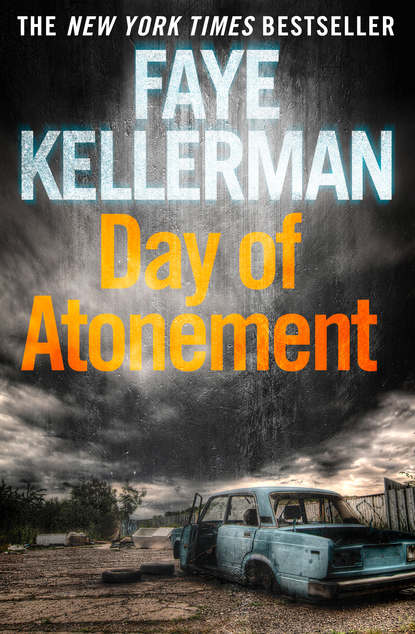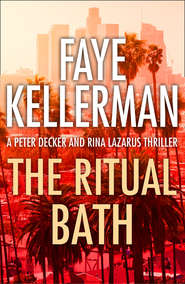По всем вопросам обращайтесь на: info@litportal.ru
(©) 2003-2025.
✖
Day of Atonement
Автор
Год написания книги
2019
Настройки чтения
Размер шрифта
Высота строк
Поля
More women had showed up, the place as crowded as an ant farm. Through the bodies, he spied Rina’s back. She was engrossed in conversation with an older woman. The lady looked around fifty-five, maybe sixty, with a long face with deep-set eyes and a wide mouth. Her skin was shiny and moist from the steam, and she kept brushing locks of brunette wig off her forehead. She was a tall woman, not slender, not fat, perfectly proportioned and dressed in business clothing as if she were attending a board meeting instead of a kaffeeklatsch.
There was something familiar about her, something very eerie. He fought down a weird sensation of having seen her before.
But that was ridiculous. He’d never met her before in his life.
Someone called out the name Frieda and the woman turned around.
And then it became painfully clear to him.
The stifling heat, the walls of the house, everything suddenly closed in upon him. Two invisible malevolent hands had reached out to strangle him.
Mrs. Lazarus noticing him. Her lips forming the word—Akiva.
Had to get out.
Out of the house.
Out of New York.
Decker bolted before she could get his name out, was halfway down the block before he heard someone racing behind him. He didn’t turn around, couldn’t. Something intangible kept his head from pivoting. With great effort, he managed to stop running, but his legs kept pumping him forward. Finally, someone caught up with him.
“Peter, stop!”
Rina’s voice. She was out of breath.
Decker kept walking.
“Stop, for God’s sake!” Rina said. “I … I have a cramp in my side.”
But he kept going.
Gasping, Rina said, “What on earth has happened to you? You’re white.”
“I’m fine,” Decker mumbled out. He sounded winded himself. Rina noticed his choppy breathing.
“You’re not fine! Are you sick? Do you need a doctor?”
“It was hot in there,” Decker said. “That’s all.” He willed his legs to stop but they wouldn’t.
“Stop, will you!” Rina cried out.
Her voice—so desperate. He slowed his pace and said, “I just wanted to take a walk.”
“You just came back from a walk.”
“I wanted to take another one,” Decker said. “What the hell is wrong with that!”
His voice sounded foreign—full of rage. Full of fear.
“I need to be alone.”
“Peter, please …” She grabbed his arm. “I love you. Tell me what’s wrong!”
Decker stopped abruptly, picked her hand off his arm, and kissed her fingers. “I’ve got to be by myself now. I’m sorry, Rina, but please leave me alone.” He dropped her hand and ran off.
Six hours to kill with fifteen dollars and twenty-two cents spending cash. Decker had left the credit cards in the bedroom, so checking into a motel for the night was out of the question. Not that he’d do it, but he wished he had the option. He found a cab at Fourteenth and Fifty-eighth, slid onto the black bench seat and ran his hands over his face.
The cabbie was Indian or Pakistani—chocolate-brown skin with straight black hair and a name with a lot of double o’s and ini’s in it. After a minute of waiting, the driver said, “What can I do for you, sir?”
The “sir” came out like serrrrr. A rolling tongue gathers no moss. Decker felt mean and punch-drunk, realized he was probably scaring the poor guy.
“What’s there to see around here?” he growled.
“See?”
“Yeah, see,” Decker said. “Any interesting sights around here?”
“Around here?” the cabbie said. “Here is very, very Jewish area.”
Very, very came out veddy, veddy.
The cabbie went on, “Not much to see except Jews, but you can see a lot of them.”
Decker said, “There a public library around here?”
He needed someplace to think, someplace to figure out how to disappear for two days.
“There is Brooklyn Central Library,” the driver said. “It is located in a very pretty park. Shall I take you there, sir?”
Decker told him to take him there. The cabbie was bent on giving a guided tour.
“I go by Flatbush Avenue. A very, very long time ago, I thought it was the longest street in Brooklyn but it is not. Bedford is.”
The avenue at best was unremarkable, at worst it exemplified everything wrong with inner cities—old crumbling buildings, trash-strewn vacant lots, and gang-graffitied tenement housing. But the cabbie seemed oblivious to this, kept on talking about how Manhattan was for the rich, but Brooklyn was where the real people lived. Decker wasn’t sure whether he was jacking up the fare by taking a longer route or was just one of those rare, friendly guys.
“Brooklyn Museum is in Prospect Park, sir. The same architect that designed Central Park in Manhattan designed Prospect Park. A very, very pretty park. You can go boating, but not now. It is tooooo cold.”
Whatever the driver’s reasons were for the tour, Decker wished he would shut up. He had to calm down and the sucker was making him veddy, veddy antsy.
He had to calm down.
Of all the people to meet.
Maybe it wasn’t her. Just maybe it wasn’t. There could be dozens of Frieda Levines. (Levine? He’d remembered it as Levy or Levin.)
Frieda Levine—a common Jewish name, it could be equivalent to Mary Smith. But even as he tried to convince himself otherwise, he knew it was no use.
The picture. That old, old picture.











